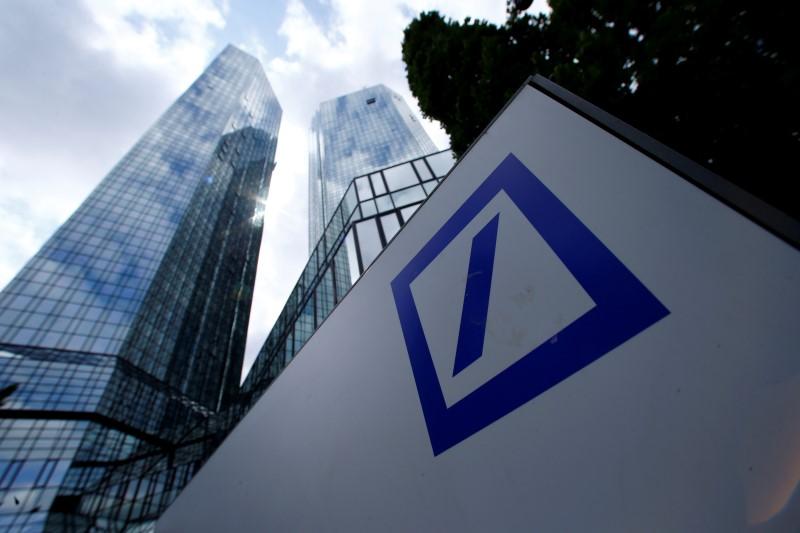Deutsche Bank, Commerzbank held talks about tie-up
FRANKFURT (Reuters) – Top executives of Deutsche Bank and Commerzbank held talks on a potential combination of Germany’s two biggest banks earlier this month, a source familiar with the matter said on Wednesday.
However, the two lenders have shelved the project as they want to complete their restructurings before taking any steps in the direction of a merger, the source said.
“There was a round of talks in late August in which (Deutsche Bank Chief Executive) John Cryan and (Chief Financial Officer) Marcus Schenck were present,” the source said.
Deutsche Bank and Commerzbank declined to comment.
German Manager Magazin earlier said that Deutsche Bank had considered the idea of a merger with Commerzbank.
Cryan called on Wednesday for cross-border bank mergers in Europe, seeing the sector’s fragmentation as placing an unacceptable squeeze on bank profits and long-term sustainability.
Criticizing what he called the “scattered regionalism among banks”, Cryan said at a financial conference: “We need more mergers, at a national level, but even also across national borders.”
Asked if he sees the time coming when Deutsche will engage in large takeovers, Cryan, himself a former M&A banker specializing in financial services during a long career at UBS, said: “Not any time soon”.
His comments come weeks after Deutsche scraped through the latest stress tests for European banks and as European Central Bank (ECB) money printing saps their ability to turn a profit.
Deutsche warned last month it may need deeper cost cuts to turn itself around after revenue fell sharply in the second quarter due to challenging markets and low interest rates.
Some analysts have argued that Deutsche would be advised to find a partner once it has stabilized its business, cut costs, and put capital and regulatory concerns behind it.
Both Deutsche and Commerzbank – the two biggest lenders in Europe’s biggest economy – have been slipping down the rankings of the continent’s top banks, hamstrung by a fragmented and competitive home market, growing regulation and negative interest rates.
Their combined market value of around 26 billion euros ($29 billion) is less than half of France’s BNP Paribas for example.
Related Coverage
- German Finance minister spokesman declines to comment on bank mergers
Deutsche shares rose 3 percent in midday trading while Commerzbank’s were up 4 percent, outpacing a 2.4 percent rise in the STOXX Europe 600 banking index.
LOW EBB
Both lenders were shown to be weaker than most peers in European stress tests last month, while profits across Europe’s banks have been under pressure with economic growth at low ebb, interest rates at rock bottom and the task of sifting through billions of euros of risky loans incomplete.
At the same time, European companies are wondering if their home banks will be able to support them internationally or whether they should turn to U.S. banks for help, Cryan said.
“This situation in Europe cannot go on,” Cryan said. “We need a strategy for our financial sector.”
Both Cryan and Commerzbank chief Martin Zielke, speaking at the same conference, said Germany was burdened by too many banks.
German banks have almost exclusively focused on earning money from charging a margin on the difference between short-term borrowing and long-term lending, using the revenue to subsidize retail and payments operations that were low-cost and often free for customers.
ECB money printing has exposed the flaws in that strategy, forcing some banks to try to charge for services or even deposits, until recently a taboo in Germany.
Mergers among banks could help remove capacity, increasing banks’ pricing power and opening the way to healthier profits.
“If we look at Germany in particular, it hasn’t gone through that wave of consolidation like Spain has, Italy seems to be moving in that direction and France has been through it,” Cryan said.
Such trends could affect Deutsche itself.
“Deutsche is a very juicy takeover target,” said Neil Wilson, analyst at ETX Capital. “It trades at about a quarter of book value and its shares are now worth a tenth what they were in 2007. In the last year its shares have halved in value, while it posted a 6.8 billion euros loss for 2015 – low-hanging fruit for those who can reach.”
Yet enthusiasm for mergers is not shared by the country’s politically powerful public savings banks.

“Recent demands for fundamental consolidation among banks are not appropriate,” savings bank association head Georg Fahrenschon told the conference, noting bigger banks had shown they could be “poison” for financial market stability.
($1 = 0.8971 euros)

